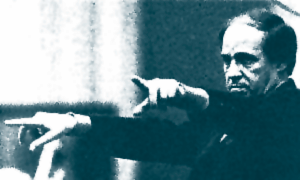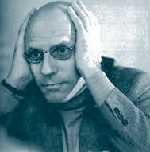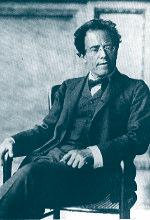|
|

|
|
|

|
|
|
|
pierre boulez
in conversation with joshua cody
|
|
|
|
|
|
|

|
|
|
|
|
|
|
Few would have imagined upon hearing the premiere of Pierre Boulez's 1956
work Le Marteau sans maître, a stunningly violent setting of poetry by René Char,
that this most iconoclastic of European avant-garde composers would one day be conducting the great
orchestras of the world. It is this tension between two personae—on the one hand, the most
revolutionary aesthetician since Schoenberg; on the other, a reconciler, the bourgeois apologist
for the extremes of the avant-garde—that have made him the most important figure in postwar
classical music; more, even, than his exquisite, reticent music, and more than his gifts as a conductor,
which ultimately demonstrate as individual and extreme approach to the art of music as Gould or
Furtwangler. Joshua Cody,
artistic director of the Ensemble Sospeso, spoke with Mr. Boulez in Chicago in 1993. |
|
|
|
|
|
 |
|
|
|
|
|
|
|
If you don't mind, I'd like to start by talking a bit about
literature, rather than about music for the moment. Michel Foucault once attributed what he
called his “first great cultural jolt” to French serialism, and especially to you
and Barraqué. Did you and Foucault influence each other?
|
|
|
|
I met Foucault very early, as a matter of fact, in 1951; but for a while I did not see
him, because I was out of France. And he was out of France, also. Then, when we met again,
that was very late in life—I mean, not terribly late, but it was not until I came back
to France, especially in 1976, that I saw him quite frequently. But I knew his books,
certainly. I think we are of the same generation. Therefore the way of thinking was very close,
even without speaking about it. This kind of proximity of thinking, of looking at things, does
not necessarily imply that thinkers are speaking together every day. When you compare us…
For instance, look at the trajectory of Webern and the trajectory of Mondrian: here are two
people who never saw each other, who never spoke to each other, who were completely ignorant
of the other's work. But you can see a very, very strong parallelism between the two
trajectories. And I think that with Foucault the case is similar. At a certain time we met,
and then for a certain period we did not meet at all; we were informed about each other, but
that was all. Afterwards, when real meetings took place much more often, there was finally the
opportunity of talking to each other.
|

Foucault. "You see, there is a very strong parallelism
between [our] two trajectories."
|
|
|
|
Some composers look upon the compositional activity of the 1950s with envy; it
appears as lively but as distant as the Renaissance. It's a perception that I think is somewhat
false; nevertheless, they feel that, in comparing that time with this time, the environment of
today is depressing. They could cite a lack of faith in further aesthetic progress; the impossibility
of individual creative volition; a feeling of entrapment, in which there are no truly original
musical gestures left, only transparent references to past historical periods. They also have the
conviction that the present historical position is absolutely unique and without precedent. So these
composers sometimes find recourse in a sort of “neo-romanticism,” or a kind of historical
collage sometimes called “post-modern.” Are these feelings, and these solutions, justified to any extent?
|
|
|
|
Well, each generation has to solve its problems. I cannot solve the problems of a generation which
is forty years younger than me, certainly not. I say always, every period is difficult. There is no
easy period. You know, when you think of the fifties, you might think it was very easy, whereas it
was not easy at all. There was always the question of whether this new discipline was not completely
absurd; there were many questions. Certainly, when I look, for instance, only at Paris, I see that
practically all the composers of my generation have disappeared. They made the wrong choices, or they
were not courageous enough, or they were not lucid enough; there are many reasons. Or, perhaps they
were politically involved, and that political involvement brought them to solutions which were very
trivial; this type of thing. So, no, it was not easy! No period is really easy.
As for historical monuments as things from which one steals a bit and places them in another context:
that's not a solution at all. You must find your own solution: I think that's the main problem. If you
are only quoting in your compositions, you are quoting! And you are quoting out of context, so there is
no justification and no logic. It's just like an antique shop, where you find a candle from the eighteenth
century, you find anything from the nineteenth century; you can go all over the centuries, but you are left
without a style. I think certain aspects of architecture have been going through the same problems
exactly: “Well, it's not possible to simply follow Mies van der Rohe, to simply follow le
Corbusier”—and so they discover the Greek column, which is not exactly a very great
discovery, in my opinion. In this way, architecture has exactly the same problems as music; but these
are simply problems to be solved. But collage: I am not tempted by that, at all. Therefore, I cannot
understand, really… I don't simply want to be “original,” I want to take out of myself
what is myself, and not only what I am looking at.
|

Mondrian,
Composition in Red,
Yellow, and Blue.
"Look at the trajectory of Webern, the trajectory of Mondrian."
|
|
|
|
Your enthusiasm for literature and the visual arts is one of the aspects of your
personality that makes you a very appealing model for other composers. I don't know how closely you
follow extremely current events in the other arts; but if you do, I was wondering if you could
generalize
whether or not this period seems to have relative cohesion, or is
characterized rather by a particular
disunity. Perhaps it's always impossible to judge.
|
|
|
|
Yes, that's very difficult to judge immediately, because we tend to relate value and style—especially
when looking at the past. When you are in the present, that is not always the case,
because some works that don't have an immense value nevertheless may have a kind of stylistic impulse
which is necessary for this period. There are some works which are much better made, let's say, much
better fabricated; and they are not interesting because they don't bring anything. So we are always
too close to the fact, although you can have your personal judgement, of course; and I have my own judgements on things.
There are many ways of approaching the problems of music nowadays. But I think there are two things
which I don't like. First, the explicit reference to the past; because I think that's useless. Second,
oversimplistic solutions, which I find really useless. Sometimes when I read some manifestos—not
manifestos, but declarations—of composers who want very simple styles, and so on, I think of
what we have gone through historically in 1947, 1948, when you had the Stalinists saying that people
should be happy… This kind of simplistic view is completely contradictory to the human being!
The human being is not simple. The human being is really complex. When you have composers behind you
like Wagner or Mahler, just to take two examples, who did find solutions which are challenging to you,
you cannot say that they did not exist or were too complex, so let's do something simple. Sometimes
these kinds of solutions remind me of fast-food restaurants: convenient but completely uninteresting.
|

Mahler. "The human being is
really complex."
|
|
|
|
How important a role does popular commercial music play, in America—not only in America,
I suppose, but in Europe as well?
|
|
|
|
Yes, in Europe as well… The good side to popular music is that there is a vitality that is going
into it; also, that popular musicians have no repertoire, so they are free from that, practically, even if
they revive songs of the Beatles, things like that; that is not repertoire. Also, what I find the most
interesting—sometimes—is the sound aspect. The sound aspect is completely new; they don't use
classical instruments, so they have to use electronic instruments, or electronically-manipulated instruments. So
that is the interesting side. The side which I don't like at all concerns the stereotypes and clichés:
this language is absurdly full of clichés, it's very simplistic, and after you have three minutes of it you
have 33,000 minutes of it. But I like the vitality. I wish sometimes that the classical department would have as much
vitality as one finds in the popular field.
|
|
|
|
|
Does there remain a large difference between the place that contemporary music
holds in Europe and the place it holds in America?
|
|
|
|
No. It's approximately the same. People are not really very different in the same type of culture
and civilization. There is a small difference here and there, but globally it is approximately on
the same level. Only, if I may say so, in the university… The danger here, in the States, is
that the universities are sometimes like fortresses, and that there is not enough contact sometimes with the outside world.
In England, it's very much the same situation. In France, we have no campuses, we have no universities which
are closed upon themselves; the universities are in the cities. Thus the intellectual or artistic life is a
unification of the university life and the life of the city. If I see any difference between the States and Europe,
that's the difference: really, it's between France and Italy on the one hand, and the Anglo-Saxon
countries on the other. German countries also have universities which are very strong.
|
|
|
|
|
|
|
|
|
|
|
|
|
|
|




 |
|
|
 |
 |
 |
 |
 |